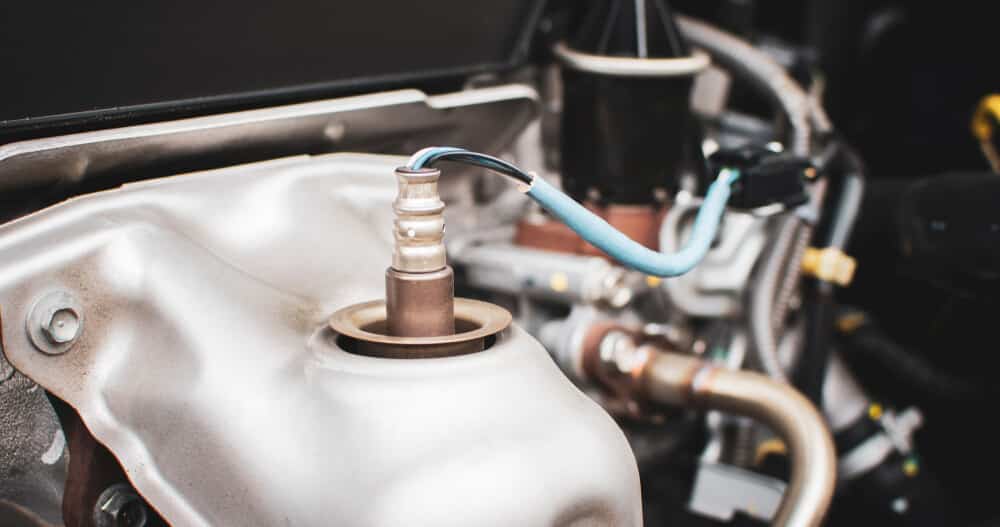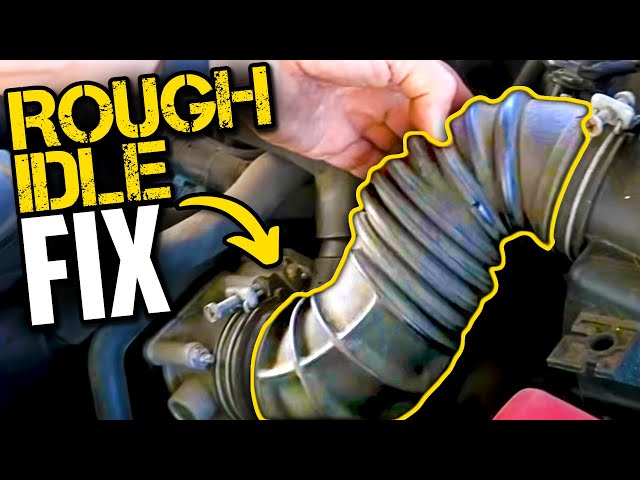Have you ever noticed your car rumbling while it’s parked and idling? This can be more than just a minor annoyance; it often indicates an underlying issue that might need your attention. Understanding the various reasons behind this rumbling can save you from costly repairs down the line and keep your vehicle performing smoothly. In this post, we’ll dive into the common causes of car rumbling at idle and provide you with some practical solutions. Let’s get to the bottom of that unsettling noise!
Common Causes of Car Rumbling When Idle

There are several reasons your car might be rumbling when it’s idling, and while some can be relatively harmless, others may signal more serious problems. Here are some of the most common culprits:
- 1. Engine Mounts - Engine mounts help stabilize the engine within the vehicle. If these mounts become worn or damaged, you may experience vibrations or a rumble that can be felt, especially at idle. Consider inspecting and replacing them if necessary.
- 2. Exhaust System Issues - A faulty or damaged exhaust system can cause loud noises and vibrations. Look out for rusted pipes, loose hangers, or damaged mufflers. These issues can not only lead to rumbling sounds but could also affect your vehicle's emissions.
- 3. Fuel System Problems - If your engine is not getting the right amount of fuel, it might struggle to maintain a consistent idle, leading to rumbling. Issues with fuel injectors or filters can result in poor fuel delivery.
- 4. Ignition System Issues - Problems with spark plugs or ignition coils can cause your engine to misfire. A misfiring engine can produce loud rumbling noises, especially at idle. Check the condition of your spark plugs and replace them if they appear worn out.
- 5. Transmission Issues - If the transmission is not engaging properly or has low fluid levels, you could experience rumbling noises while idling. It's crucial to maintain your transmission fluid levels and ensure there are no leaks.
Identifying the cause of the rumbling is the first step. By addressing these common issues, you can help ensure your vehicle runs smoothly and quietly. If the noise persists, don’t hesitate to consult a mechanic for a thorough inspection!
1. Engine Issues

When your car starts rumbling while idling, one of the first culprits to consider is engine issues. The engine is the heart of your vehicle, and if something's not right here, it can certainly lead to a bumpy experience. Let’s dive into some common engine-related problems that might be causing that pesky rumble.
- Misfiring Cylinders: If your engine has a misfire, it means that one or more cylinders aren't firing properly. This can lead to a rough idle and noticeable rumbling.
- Dirty Fuel Injectors: Fuel injectors that are clogged or dirty can disrupt the airflow to the cylinders. This lack of fuel can cause the engine to struggle, resulting in a rumbling sound.
- Worn Engine Mounts: Engine mounts are meant to keep your engine stable. If they wear out, they can allow the engine to vibrate more than usual, amplifying sounds during idle.
- Vacuum Leaks: If there's a leak in the vacuum system, it can create an imbalance in the air-fuel mixture, leading to an unstable idle and rumbling noises.
To diagnose these issues, it's essential to listen carefully when your car’s idling and check for any engine warning lights on your dashboard. Regular maintenance can help prevent these problems, but if you're experiencing a rumbling sensation, it’s wise to consult a mechanic for a thorough inspection.
2. Exhaust Problems
Another common reason for car rumbling at idle could very well be linked to exhaust problems. The exhaust system plays a pivotal role in directing harmful gases away from your engine and cabin. When something goes amiss in this system, it can lead to unusual noises, such as that rumbling sound.
- Leaks in the Exhaust System: A leak in the exhaust pipes, manifold, or muffler can create a rumbling sound while the car is idling. It not only affects noise levels but can also lead to decreased fuel efficiency.
- Damaged Muffler: The muffler is designed to minimize noise. If it becomes damaged or rotted out, your car may produce a louder rumble, especially during idle.
- Exhaust Blockages: Any blockage in the exhaust system, such as debris or a broken component, can cause back pressure, leading to abnormal sounds when the engine is running.
- Faulty Oxygen Sensors: If oxygen sensors malfunction, they can alter the air-fuel mixture going into the engine, which may lead to inconsistent idling and exhaust noises.
If you suspect that your exhaust system might be at fault for the rumbling, it's a good idea to have a professional inspect it. Ignoring these issues can result in more serious repairs down the line, not to mention potential health hazards from exhaust fumes. Regularly checking your exhaust system can save you time, money, and peace of mind!
3. Transmission Concerns
Have you ever been idling at a stoplight or in your driveway, only to notice your car vibrating or rumbling unexpectedly? Well, one of the culprits could be problems related to your car's transmission. Transmission issues tend to be silent but deadly, meaning they might not always show obvious symptoms until they become serious. Let's explore some common transmission-related problems and their solutions.
- Low Transmission Fluid: One of the most common transmission issues is low fluid levels. If your car is low on transmission fluid, it can lead to harsh shifting and even make your vehicle seem like it’s rumbling when stationary. Regularly checking your fluid levels can help avoid this problem.
- Transmission Mount Issues: The transmission is secured to your vehicle by mounts that can wear out over time. If these mounts are damaged or worn, the vibration can travel through your car, creating an uncomfortable rumbling sensation during idle.
- Internal Transmission Failure: The age of your vehicle can come into play here. Older transmissions may develop internal wear or component failure resulting in erratic behavior, including unwanted vibrations or noise when idling.
If you suspect that your transmission is the root of your idling woes, it's best to consult with a professional mechanic. Regular maintenance and immediate attention to any issues can extend the life of your transmission and ensure a smoother ride.
4. Fuel System Problems
When it comes to car maintenance, the fuel system is often overlooked until something goes wrong. Did you know that issues within your fuel system could also lead to that annoying rumbling noise at idle? Let's dive into some common fuel system problems and how they might be linked to your vehicle's performance.
- Clogged Fuel Filter: A clogged fuel filter can restrict the flow of fuel to your engine, causing it to run rough and vibrate while idling. If you haven't changed your fuel filter in a while, this could be the source of your rumbling problem.
- Dirty Fuel Injectors: Fuel injectors play a crucial role in delivering fuel into your engine. If they’re dirty or malfunctioning, they can cause irregular fuel delivery. This can lead to misfiring or a rough idle, resulting in vibrations or rumbling sounds.
- Fuel Pump Issues: If your fuel pump is failing, it may struggle to deliver fuel at the correct pressure. This can lead to an inconsistent fuel supply and may cause your engine to idle poorly, creating a noticeable rumble.
If you suspect fuel system issues are behind your car's rumbling at idle, taking it to a mechanic for diagnostic tests is a must. Keeping your fuel system clean and in good working order can prevent many common issues associated with rough idling.
5. Mechanical Component Failures
Car rumbling at idle can often be attributed to mechanical component failures, which can be quite a headache for any car owner. Let’s dive into some of the common culprits that might be causing that unsettling noise.
- Engine Mounts: Worn or damaged engine mounts can allow excessive engine movement, leading to vibrations that result in a rumbling sound when the engine is at idle. If the mounts are failing, you might notice other symptoms such as a rough ride, excessive noise, or unusual shifting during acceleration.
- Exhaust System: A failing exhaust system, especially a damaged muffler or loose connections, can cause rumbling sounds. Leaks can also create an abnormal flow of exhaust gases, leading to that dreaded rumble. Listen for any hissing or popping sounds coming from the exhaust at idle.
- Timing Belt or Chain: An improperly adjusted or worn timing belt or chain can lead to misalignment in the engine components, which can cause excessive noise and vibrations while idling. Keeping up with regular maintenance on these components is crucial!
- Drivetrain Components: Components such as the transmission and driveshaft can contribute to rumbling if they’re not functioning properly. Issues here could also manifest as a bumpy ride or difficulty shifting gears.
Addressing mechanical failures not only helps eliminate that annoying rumbling but also promotes the overall health and longevity of your vehicle. Identifying these issues early leads to less severe problems down the line.
8. Solutions to Fix Car Rumbling
So, you've identified the potential causes of your car rumbling at idle. What’s next? Let’s explore some effective solutions to put that unsettling noise to rest!
| Issue | Solution |
|---|---|
| Worn Engine Mounts | Replace the engine mounts with new ones. This may require professional help, so don’t hesitate to visit a mechanic. |
| Damaged Exhaust System | Inspect the exhaust system for leaks and damage. Repair or replace any faulty components. |
| Improperly Aligned Timing Belt/Chain | Adjust or replace the timing belt/chain as necessary. Regular checks are vital. |
| Faulty Drivetrain Components | Have a professional inspect the drivetrain and address any issues found, whether it’s repairing or replacing parts. |
In addition to these targeted solutions, it's also wise to keep up with routine maintenance, including oil changes, part inspections, and ensuring all components are functioning within their operational parameters. A little preventative care can save you a lot of trouble and expense down the road!
By understanding the common causes of car rumbling and implementing the appropriate solutions, you'll enjoy a smoother, quieter ride while ensuring your vehicle remains in great shape.
Understanding Car Rumbling at Idle: Common Causes and Solutions
Experiencing a rumbling noise from your car while it is idling can be concerning. Several issues could be at play, and understanding them is crucial for any car owner. Below are some common causes and corresponding solutions for car rumbling at idle:
| Common Causes | Possible Solutions |
|---|---|
| 1. Faulty Engine Mounts | Inspect and replace damaged engine mounts to reduce vibrations. |
| 2. Exhaust System Issues | Check for leaks or damages in the exhaust system and repair or replace as needed. |
| 3. Dirty Fuel Injectors | Clean or replace fuel injectors to ensure proper fuel delivery and engine smoothness. |
| 4. Worn Spark Plugs | Replace spark plugs to ensure efficient combustion and reduce rumbling noises. |
| 5. Vacuum Leaks | Check hoses and gaskets for leaks, and replace or reseal as necessary to restore vacuum pressure. |
Moreover, it’s beneficial to perform regular maintenance checks, including oil changes, filter replacements, and examining the vehicle's spark plugs, as these practices can prevent or identify problems early on.
It’s essential to address car rumbling at idle promptly. By identifying the root causes and applying the appropriate solutions, vehicle owners can ensure smoother operation, enhance fuel efficiency, and prolong the lifespan of their car.
Conclusion
In summary, understanding the common causes of car rumbling at idle and knowing the effective solutions can help maintain vehicle performance and safety.
 admin
admin








